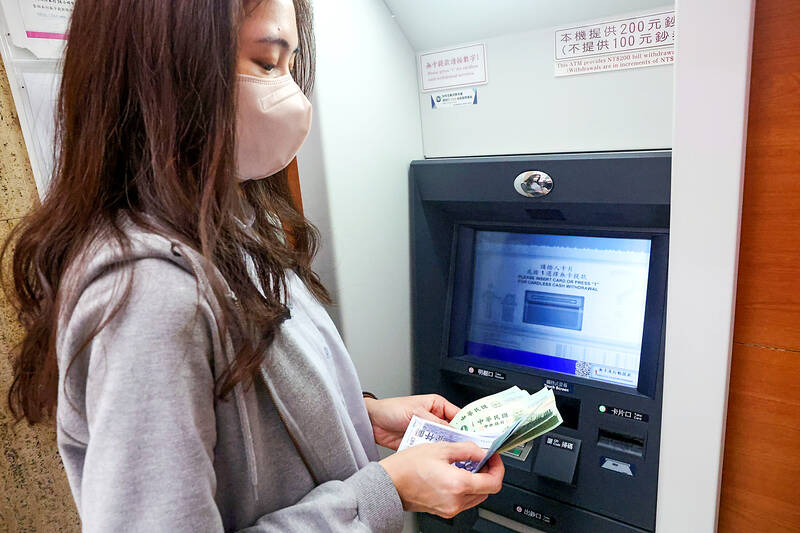Taiwan has outperformed global averages in multiple financial inclusion categories, a report released on Monday by the Financial Supervisory Commission (FSC) said.
Financial inclusion is a concept adopted by the UN in the 2000s that refers to ensuring that all members of society have equal access to responsible and sustainable financial services.
Although it covers the availability of services for the general population, it is also aimed at making sure more vulnerable members of society, including the elderly, people with disabilities and lower-income households, have equal access to financial services.

Photo: CNA
The report, based on last year’s data, showed that Taiwan has 165 ATMs per 100,000 adults, more than triple the global average of 52.5, and 17 bank branches per 100,000 adults, also higher than the global average of 16.2, the commission said in a statement.
Mobile payment usage in Taiwan reached nearly 5.62 million transactions, well above the global average of 4.72 million, the report said.
The share of adults with a bank account in Taiwan stood at 93.3 percent, and 81.6 percent used digital payments — both notably higher than the global averages of 76.2 percent and 64 percent respectively, the report said.
Among the FSC’s metrics for disadvantaged groups were statistics for microinsurance and small-amount whole life insurance.
The availability of these products has grown steadily in the past few years, with the number of people covered by microinsurance in Taiwan reaching 1.89 million last year, and active small-amount whole life insurance policies totaling 1.19 million, the FSC said.

Sweeping policy changes under US Secretary of Health and Human Services Robert F. Kennedy Jr are having a chilling effect on vaccine makers as anti-vaccine rhetoric has turned into concrete changes in inoculation schedules and recommendations, investors and executives said. The administration of US President Donald Trump has in the past year upended vaccine recommendations, with the country last month ending its longstanding guidance that all children receive inoculations against flu, hepatitis A and other diseases. The unprecedented changes have led to diminished vaccine usage, hurt the investment case for some biotechs, and created a drag that would likely dent revenues and

Global semiconductor stocks advanced yesterday, as comments by Nvidia Corp chief executive officer Jensen Huang (黃仁勳) at Davos, Switzerland, helped reinforce investor enthusiasm for artificial intelligence (AI). Samsung Electronics Co gained as much as 5 percent to an all-time high, helping drive South Korea’s benchmark KOSPI above 5,000 for the first time. That came after the Philadelphia Semiconductor Index rose more than 3 percent to a fresh record on Wednesday, with a boost from Nvidia. The gains came amid broad risk-on trade after US President Donald Trump withdrew his threat of tariffs on some European nations over backing for Greenland. Huang further

CULPRITS: Factors that affected the slip included falling global crude oil prices, wait-and-see consumer attitudes due to US tariffs and a different Lunar New Year holiday schedule Taiwan’s retail sales ended a nine-year growth streak last year, slipping 0.2 percent from a year earlier as uncertainty over US tariff policies affected demand for durable goods, data released on Friday by the Ministry of Economic Affairs showed. Last year’s retail sales totaled NT$4.84 trillion (US$153.27 billion), down about NT$9.5 billion, or 0.2 percent, from 2024. Despite the decline, the figure was still the second-highest annual sales total on record. Ministry statistics department deputy head Chen Yu-fang (陳玉芳) said sales of cars, motorcycles and related products, which accounted for 17.4 percent of total retail rales last year, fell NT$68.1 billion, or

HSBC Bank Taiwan Ltd (匯豐台灣商銀) and the Taiwan High Prosecutors Office recently signed a memorandum of understanding (MOU) to enhance cooperation on the suspicious transaction analysis mechanism. This landmark agreement makes HSBC the first foreign bank in Taiwan to establish such a partnership with the High Prosecutors Office, underscoring its commitment to active anti-fraud initiatives, financial inclusion, and the “Treating Customers Fairly” principle. Through this deep public-private collaboration, both parties aim to co-create a secure financial ecosystem via early warning detection and precise fraud prevention technologies. At the signing ceremony, HSBC Taiwan CEO and head of banking Adam Chen (陳志堅)